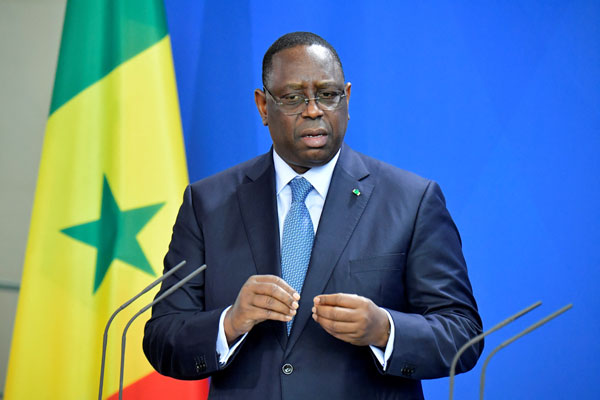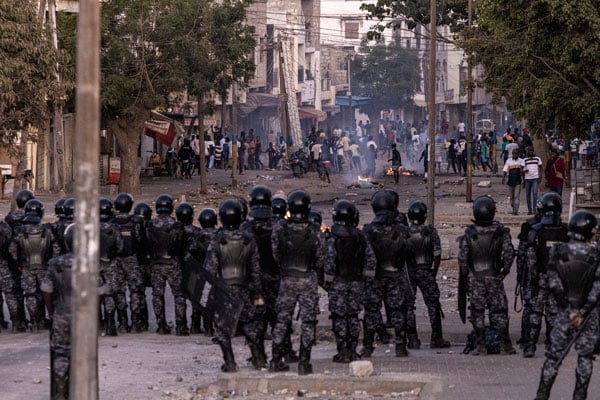'Mr Stony Face': Senegalese President Macky Sall

Senegal's President Macky Sall speaks during a joint press conference with German Chancellor on January 27, 2020 at the Chancellery in Berlin.PHOTO/ AFP
What you need to know:
- The 61-year-old president has ended months of suspense over whether he would seek to stay in power in the West African nation, a bastion of democracy in a troubled region.
- To his critics, Sall has adopted an iron-fisted approach, destabilising a country widely admired for its democracy and stability.
Senegal's President Macky Sall, who announced Monday that he would not seek a controversial third term in office, has a soft-spoken demeanour that observers say belies stubbornness and hidden fire.
He "is genuinely shy but misleadingly gentle", said Cheikh Yerim Seck, author of a book on life in Senegal under Sall.
The 61-year-old president has ended months of suspense over whether he would seek to stay in power in the West African nation, a bastion of democracy in a troubled region.
His announcement coincided with a call by his bitter rival, Ousmane Sonko, for mass protests against a president he described as corrupt and a would-be dictator.
Tall and broad-shouldered, Sall has the nickname in the Wolof language of "Niangal", translatable as "Mr Stony Face" -- an appropriate tag for someone whose first love was geology.
Sall was one of five children born in modest circumstances to a caretaker father and a mother who worked as a peanut seller.
After studying as a geological engineer and briefly flirting with Maoism, he rose through the ranks of the national oil company Petrosen.
There he was spotted by the president at the time, Abdoulaye Wade, who appointed him minister of mining and energy in 2001.
From there, he became interior minister and prime minister and handled Wade's re-election campaign in 2007, for which he was rewarded with the post of National Assembly speaker.
'Warriors'
But within a year, Sall's dramatic ascent came to a bruising halt.
He fell out with Wade for ordering his son, who at the time ran a company contracted to do work for an Islamic Conference summit, to testify in parliament over suspected fraud.
Forced out as speaker by pro-Wade MPs, Sall quit all his elected positions, left the president's Senegalese Democratic Party (PDS) and set up his own group, the Alliance for the Republic-Yakaar, or APR.
"I come from a long line of warriors who prefer to die rather than lose face," Sall said in 2019 at the launch of his autobiography, "Senegal in the Heart."
In 2012 came the payback. Sall routed his erstwhile mentor in the second round of bitterly contested elections.
He united the opposition behind a campaign that accused Wade of breaching the constitution by seeking a third term.
Wade put forward an argument that would ironically resonate among Sall's supporters a decade later.
He argued that the two-term limit had been reset by a constitutional revision during his time in office.
Economic focus
Sall has staked his reputation on his economic record, something that some of his fiercest critics grudgingly accept has been a success.
He points to an increase in agricultural production and a huge infrastructure programme, including a new airport and new town outside Dakar, a regional express train and highways, as well as a boost in health insurance coverage.
His declared goal is that by 2035, Senegal will have been elevated from a developing to an "emerging" economy.
Sall has also had success in bringing calm to Senegal's separatist-troubled southern region of Casamance, and played a key part in forcing out dictator Yahya Jammeh in neighbouring Gambia in 2017.
Sall speaks French and English in addition to three other languages spoken in Senegal.
He is married to Marieme Faye Sall, whom he met while she was still in high school. They have two sons and a daughter.
To his critics, Sall has adopted an iron-fisted approach, destabilising a country widely admired for its democracy and stability.
In his autobiography, Sall said his second term in office would be his last, but in recent months he has become coy about whether this would be the case.
Sall has "drifted to authoritarianism... jailing or exiling his most threatening opponents," three of Senegal's most prominent intellectuals, Mohamed Mbougar Sarr, Felwine Sarr and Boubacar Boris Diop, said recently in a joint commentary.





